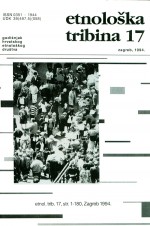Plaidoyer za istraživanje (nacionalnog) identiteta u hrvatskoj etnologiji
A Case for Studying (National) Identity in Croatian Ethnology
Author(s): Jasna Čapo ŽmegačSubject(s): Customs / Folklore, Cultural Anthropology / Ethnology, Culture and social structure , Nationalism Studies, Rural and urban sociology, Identity of Collectives
Published by: Hrvatsko etnološko društvo
Keywords: national identity; Croatian ethnology; culture; Croatian peasant culture; folklore;
Summary/Abstract: In a previous article the author has expounded a thesis that Croatian ethnology has not contributed to a research into Croatian cultural identity and the role of culture in the construction o f national identity. In this one, the author elaborates this thesis further by reviewing ethnological research in Croatia and by presenting several foreign contributions which, in her opinion, open avenues to a future research into collective, especially national, identity in Croatian ethnology. That literature has as its main content construction o f identity and foundation of national culture and national identity, research into the historical phases of the emergence of national culture, possible concurrent images of national identity that might have existed parallel or interchangeably, multiplicity and complexity of national identity which is made up from a series of regional, social, confessional, cultural, ethnic and other identities, etc. It is argued that the need for a contemporary study of identity is twofold. It is generally accepted that rapid social and cultural changes after World War II have increased the feeling of alienation of modern man, and spurred his search for identity. Moreover, we witness a moment of forging of new identities at various levels of society - at the same time at a supranational level (European), and at the levels lower that the nation-state (regional and local). That moment is specific in Croatia because of its insecure present and the traumatism caused by the war on its own territory and on the territory of the nearby Bosnia and Herzegovina. Therefore, we live in a period of search for and production of identity, which, in the author’s view, compels contemporary ethnologists to pay attention to these processes. Croatian ethnologists have studied objective contents of Croatian peasant culture. Their main aim has been to ascertain the affinity of cultural elements contained in this culture with the cultural elements o f other cultures, i. e. to reconstruct the origin of elements found in Croatian peasant culture. They have found that in its peasant stratum it was a predominantly Slavic culture with more or less big number of elements borrowed from other cultures with which the Croats had come into contact (it is also claimed that in certain regions their number is so great that it is doubtful whether one can continue to speak o f a predominantly Slavic culture). If we take that this research can indirectly tell us something about Croatian cultural identity, then it can be said that Croatian identity has been depicted as the identity o f one social stratum (peasant) at a particular moment in time (second half of the 19th and first half of the 20th c.). Based on such a research into objective contents o f culture, the cultural identity indirectly acquires the traits of a fact that can be objectively posited. This means that it is ascribed to the group from without, while it is irrelevant whether the ascribed traits have any affective value or meaning for the people. This is a corollary of a prevalent kind of research in Croatian ethnology in which cultural artifacts and not people were the focus o f analysis. The approach was ethic and objective, and lacked completely anemic and subjective perspective. Moreover, it paid no attention to micro level cultural change, which is expected to be reflected in changeable identities. It is clear that Croatian ethnology can no more be satisfied not only with such a general approach in ethnology (though there is a resistance to such a view) nor with a lack of direct research into identity. However, to some extent Croatian ethnologists have paved the way to future studies of identity. First, regional plurality of Croatian peasant culture allows for the expectation that the identities it engenders will also be plural (though the plurality stems not only from regional but also from social, confessional, ethnic and other variation). Second, they have insisted on the complex relationship between culture and ethnic identity. Third, by in-depth studies on the micro level in the communities of direct and intense contact of members they have indirectly developed the methodology of research into local identity. Fourth, the distinction made between folklore and folklorism (also called ethnic folklore and folklore of ethnicity) will be another valuable tool in future research into identity.
Journal: Etnološka tribina : Godišnjak Hrvatskog etnološkog društva
- Issue Year: 24/1994
- Issue No: 17
- Page Range: 7-23
- Page Count: 17
- Language: Croatian

